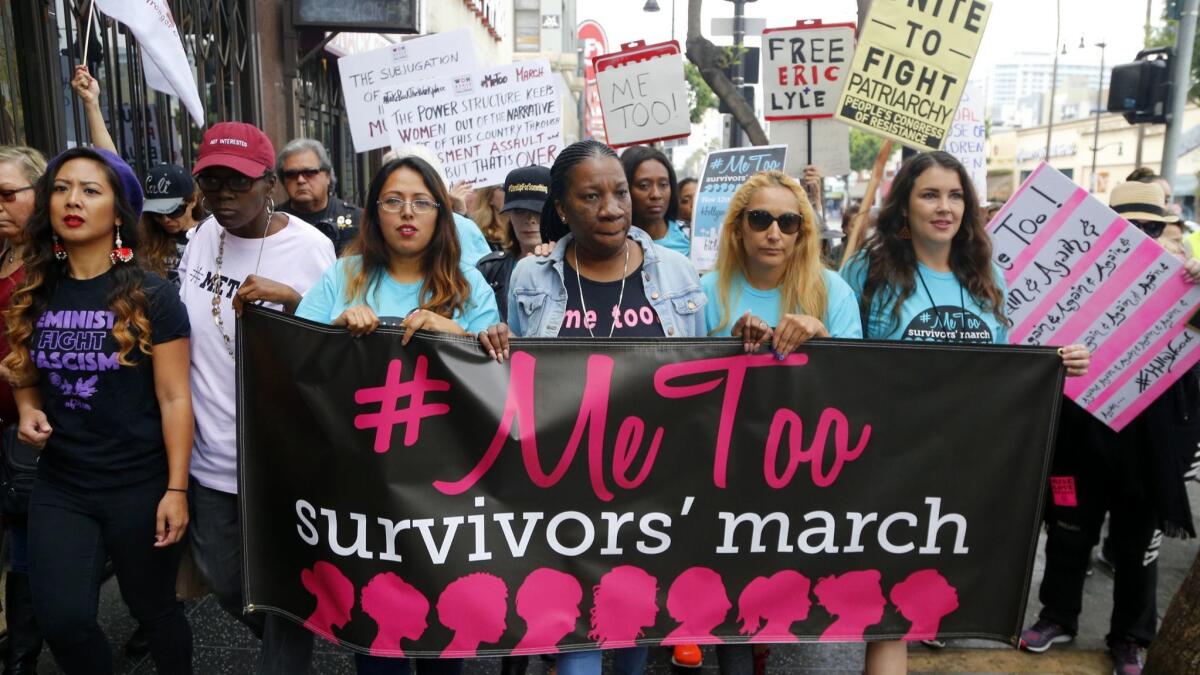A book for all the angry ladies

As a journalist, Rebecca Traister is always hoping her books are timely. Her first, âBig Girls Donât Cry,â came out in 2010, soon after the bruising 2008 Democratic primary season she chronicled in its pages. Her second, âAll the Single Ladies,â arrived in 2016, a celebration of womenâs power at a time the country seemed poised to elect its first female president.
But thatâs nothing compared to Traisterâs newest. âGood and Mad: The Revolutionary Power of Womenâs Angerâ was published by Simon & Schuster on Oct. 2, during the week the nation was riveted by Senate confirmation hearings for Supreme Court nominee Brett Kavanaugh. Reached by phone as she rode in a car from the San Francisco airport to a series of interviews and appearances, Traister, who was among those advocating against Kavanaughâs confirmation, sounded weary but resolved. She acknowledged that this isnât the kind of timeliness an author always wants.
âI feel pretty torn about being out there selling books in the midst of this, and selling books to some degree off of this,â she said. âThis is a terrible time. Obviously, there have been many terrible times over the past two years, but this time the thing thatâs being absorbed is that the terrible time is going to extend deep into our future, for the rest of our lives.â
In addition to Kavanaughâs lifetime appointment to the nationâs highest court, Traister continued, what made the confirmation battle so difficult was the way the hearings illustrated a cultural imbalance when it comes to anger.
âThatâs what the last two weeks have shown us,â Traister said. âA man yelling on his own behalf very quickly appeals to a certain segment of the population. Itâs reflectively understood that his anger is amplifying his case. Whereas the woman â women arenât permitted to be angry and still taken seriously. They are treated as fundamentally irrational, animalistic, infantile; their anger takes away from whatever point they want to make.â
While Kavanaugh yelled and wept as he rebutted accusations of sexual assault, his accuserâs appearance before the Senate Judiciary Committee was notably careful, restrained and quiet. âWould I have ever advised Christine Blasey Ford to be as angry as she has every right to be, while giving testimony?â Traister asked, before answering her own question: âNo, I would not. There are penalties to be paid for anger, and the way that anger is used to discredit the women who give voice to it.â
In âGood and Mad,â Traister argues that womenâs anger â as dangerous as it can be to voice it â has sparked social and political action throughout American history. Itâs no accident that cultural messages discourage women from voicing anger; all of them stem, Traister writes, âfrom the correct understanding of those in power that in the fury of women lies the power to change the world.â
The stereotype of the angry feminist was very much in vogue when Traisterâs writing career began, first as a film reporter for the New York Observer at the turn of this century. âIâd been raised in a world with the idea that to be a feminist was to be not listened to, was to be reflexively marginalized, to be caricatured as unpalatable, furious in a way that I understood was bad,â she said. Her own early feminism, she added, was rudimentary, lacking an understanding of the intersections of race, class and gender. Covering two decades of social change â from riot grrrls to slut walks, from #MeToo to the Black Lives Matter movement, from the 2016 election to the Womenâs March â has deepened her understanding.
In particular, Traister said, itâs crucial for white women like herself to deeply listen to women of color, to actively fight against white supremacy in feminist and other social movements. âMy only prescription is to start taking the anger of women around you seriously, politically seriously, socially seriously, even if itâs anger at you,â she said.
All social movements are messy, she added, but seeking unity at the expense of shutting down other womenâs voices is not the answer. âWhen those with less power interfere with those who have more power, theyâre seen as disruptive,â Traister said. But in a country where a majority of white women have voted Republican since tracking began, she added, âI believe this anger needs to be aired. The internal back and forth within feminism is crucial to its good health. I think the key is to welcome as many people who want to be in this fight as we can, and at the same time to say, âBut that doesnât mean itâs going to be about you: Youâre not going to be the center. Look for leadership to those whoâve been here a long time. Do a lot of listening.ââ

But doesnât anger tend to turn inward, leading to depression and burnout? âIâve been thinking a lot about this,â Traister said. âI wrote a book thatâs generally on the side of anger, but it also acknowledges that anger can corrode, it can sap your energy, it can divide, it can create confrontation.â But at the same time, she added, âI also see anger as a great connector. One of the reasons that womenâs anger is suppressed and discouraged is because it keeps women who are angry about inequity isolated from each other.â
The current moment is unusual, Traister said, in its combined political seriousness and social upheaval. âWomen are angry about all kinds of inequities. But when it comes to a kind of mass fury about gender inequality, these things can only happen about every 60 years, because itâs so hard,â she said. âBecause to question the gender hierarchy and the gender power structure means interrogating some of our most intimate relationships. It means interrogating not just bad guys, but our good guys. If it were easier, we would have done it a long time ago.â
It wonât happen overnight. âWe canât snap our fingers and change the cultural messages about angry women that have been with us since antiquity. This is old, deep stuff,â Traister said. The dangers America faces right now, she added, are âvery grave. The power abuses at the top right now mean that we might not survive â as a country, as a democracy.â Still, she said, âI do believe in the power of social change. This country was founded with slavery as its economic and cultural base, with women disenfranchised, legally barred from full economic or political participation. It took centuries of labor, and people living and dying, to make those changes. But they did get them changed. So I canât bring myself to get hopeless yet.â
Traister profiles a long line of angry women in âGood and Mad,â including notable names such as Elizabeth Cady Stanton, Fannie Lou Hamer, Audre Lorde and Gloria Steinem. But she also explores the narratives that omit female anger and agency â such as the myth that Rosa Parks was just a tired seamstress (in fact, she was an experienced civil rights activist) â and the double bind that effectively silences women who want to use their voices in politics. âWe donât have models for women who convey anger in a way that can be identified as righteous, in a way that might be politically and electorally useful,â Traister said. âAnd, of course, we have that for men.â
Watching Kavanaughâs furious denials, Traister added, she knew it was likely to work. âThatâs not to say I didnât have hope in my heart; I did. But I also felt pretty sure they were going to jam this guy through,â she said. The Supreme Court is poised to become much more conservative now, she added. âThe purpose of the court as it is being remade right now, is to first of all reverse the progress that has been made by previous generations. Itâs to undo everything from voting rights, labor protections, collective bargaining rights, affirmative action, reproductive rights, various avenues to access to birth control. All those things are on the table.â
And yet that isnât cause for despair. âI think if we didnât feel optimism at this juncture, it would be very deadening. And what are we going to do, if weâre not going to keep fighting? I believe that continuing to fight is a moral imperative for those who want to make the country a better and more just place.â
Tuttle is the president of the National Book Critics Circle.
More to Read
Sign up for our Book Club newsletter
Get the latest news, events and more from the Los Angeles Times Book Club, and help us get L.A. reading and talking.
You may occasionally receive promotional content from the Los Angeles Times.







